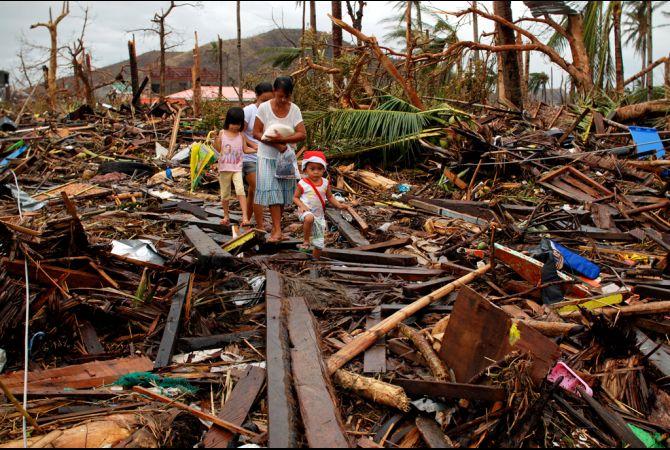When Typhoon Haiyan hit the Philippines November of 2013, the world was stunned. The United States immediately reached out, sending tons of aircrafts and ships to the area, raising millions of dollars in support and airdropping supplies to the struggling survivors. But now it’s February of 2014, and the civilians are still flailing while thousands continue to go unaccounted for. Is there something more we can be doing?
The storm absolutely leveled houses and destroyed everything that people had, but their most arduous task has nothing to do with their possessions. According to NPR, “Authorities are still struggling with the simplest tasks, such as clearing away debris, rebuilding houses and counting the dead.” Haiyan swooped in, dominated everything in its path, and people in the Philippines can’t even clean up to try to recover their lives, let alone give a proper goodbye to all those that have been lost.
Bubi Arce, a Tacloban native, had to start picking up bodies from the streets after the storm with his friends because no one else was doing it. “He’s the guy in charge of collecting, burying and identifying bodies in the city — about 2,500 of them. That’s about a third of the total dead in the whole region,” said NPR.
Things are better than they were a few months ago, but people are struggling. The simplest headline from an NBC article moved me so much the other day that I became so troubled by this issue; it said, “’Nothing’s changed:’ Philippine typhoon survivors fear being forgotten.” How terrible that a relatively helpless area thinks that no one out there seems to care?
This is not to take away from anything that so many wonderful people are doing; there are people who have devoted their lives to helping these people in the past three months, and for that, we’re all grateful. But NBC reported that, “Just as their needs have shifted from emergency aid to long-term rehabilitation, an increasing number of aid organizations appear to be packing up and going home.” A Western aid worker reminded us that this is an all too common theme: “We saw this in Haiti and we’re seeing it again here in the Philippines.” We as a country have done a lot to help, that is true. But natural disasters and terrible civil wars aren’t just a hiccup; they derail thousands, even millions of lives. The worker added, “The NGOs come in by the dozens, flex their muscles and spend their budgets in front of the news cameras, but when push comes to shove and victims need help dealing with long-term issues – like getting back their livelihoods or homes – they’re gone.”
Every single one of us should take it to heart that our “help” seems superficial and is fleeting, and frankly leaves people out to dry when they need it most. While the issues in Syria are much more complicated than a natural disaster, people are struggling in similar ways. A medic in Aleppo, where there was an air raid that killed at least 90, told CNN, “The situation is very urgent. We need U.S. pressure on the regime for us to be able to take a breath, to have them stop this aggressive shelling on Aleppo.” Could this work? Maybe; but on the simplest of terms these people need help in any form.
CNN also reported that “Human Rights Watch said the Syrian government ‘deliberately and unlawfully’ demolished thousands of homes in rebel strongholds,” and while they can’t exactly verify the death toll, it’s estimated that at least 100,000 have been killed in Syria since just 2011.
As a person in wealthy, free, democratic America, there is always something we can do. Can you even fathom walking out of your dorm room or house and being attacked by your own government? Or losing an arm and not having anything to help you? Losing a loved one and not being able to locate their body? We take for granted nearly everything we have here, and even if we can’t get a regime to stop attacking its people, we can find organizations that will help and contribute to them.
At the simplest of levels, if we physically cannot do anything for people in these trying times, we can practice gratitude in our own lives. Thank your parents for sending you here (if that’s the case), recognize that while you might think your dorm room is small, millions of people don’t even have a roof over their heads. Life could be much worse, and the last thing that we want to feed is the idea that we don’t care about someone else’s pain. Reach out every time that you can, because big or small, it’s helping.













































































































